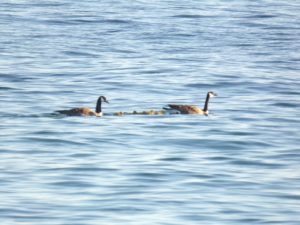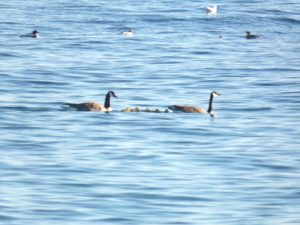The morning was calm and clear today, though it was not until the third hour when the diversity started increasing while the temperature and cloud cover also started increasing. The winds mostly came from west to southwest, and only climbed to seven miles per hour by 11:00 AM. Thanks to a calming of the winds since yesterday, the straits were very flat, revealing a staggering number of Red-breasted Mergansers and Long-tailed Ducks. There were no grebes today, the White-winged Scoter count was low, and the loons were not moving west until the final hours- including a lone Red-throated Loon. A family of Canada Geese also visited the shallow waters in front of the observation area, and nestled between two adults were five goslings. There were a substantial number of visitors to the lake shore, though only one actually expressed any genuine interest in what I was doing: Ed Pike. At around the same time he arrived, there was another group of people who appeared to be performing a Native American ceremony. According to Ed, the practitioners called it a “blessing of the water”. By the end of the observation period, the skies over the Upper Peninsula showed signs of approaching rainfall.
Canada Goose – 15
Mallard – 2
Lesser Scaup – 1
White-winged Scoter – 5
Long-tailed Duck – 543
Common Goldeneye – 2
Common Merganser – 10
Red-breasted Merganser – 348
Red-throated Loon – 1
Common Loon – 15
Double-crested Cormorant – 68
duck sp. – 7
Other Species:
Great Blue Heron – 5
Turkey Vulture – 1
Osprey – 1
Sharp-shinned Hawk – 1
Bald Eagle – 3
Red-tailed Hawk – 1



